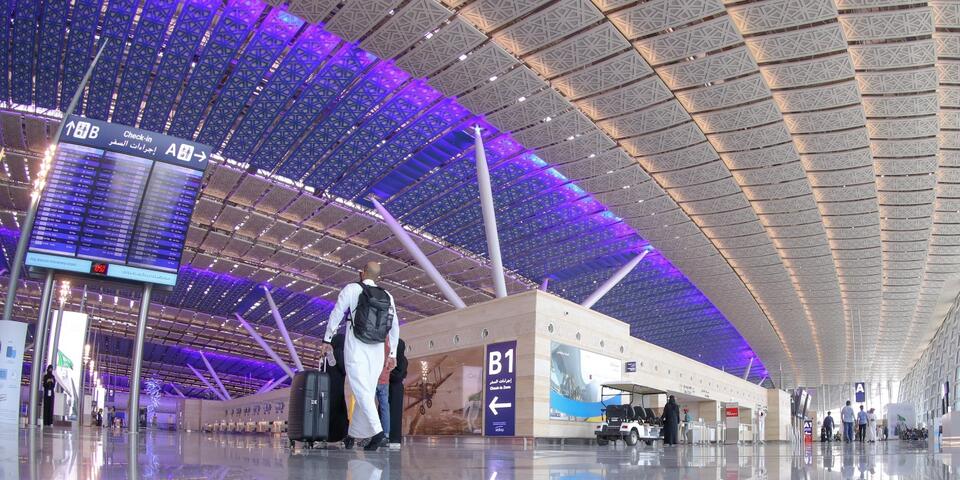
Experts welcome return of international travel; Flydubai confirms flights to Dammam and Riyadh are now operating; Emirates to resume flights to Jeddah on Monday
The reopening of Saudi Arabia’s borders to international travellers is “vital” to the kingdom’s economic recovery from the effects of the coronavirus crisis.
The reopening of Saudi Arabia’s borders to international travellers is “vital” to the kingdom’s economic recovery from the effects of the global coronavirus crisis, according to a leading aviation expert.
However, Saj Ahmad, chief analyst at StrategicAero Research, told Arabian Business that the need to produce negative PCR results in order to travel may stifle demand.
He said: “While the re-opening of air bubble channels will allow many people to come back into the country, it probably will not result in a cash windfall for Saudi airlines given the choked demand for travel and the deterrent many see in costly PCR tests prior to flying.”
Saudi had followed the lead of several countries last month in completely closing its borders after a new ‘mutant’ strain of Covid-19 was discovered, primarily emanating from the United Kingdom and South Africa.
The closure was extended over a two-week period, but on Saturday it was announced that the restrictions would be lifted.
“The Saudi economy has long since relied on aviation to be a catalyst for income beyond oil revenue, particularly from Haj and Umrah pilgrimages – and so re-opening borders is vital for the country which, like all others, has been battered by the Covid-19 pandemic,” said Ahmad.
In a statement on Monday, Saudi’s Ministry of Interior said that non-citizens entering from the UK, South Africa or any other countries where the new variant spread, will require to stay at least 14 days out of these countries before entering the kingdom.
 All travellers arriving from the rest of the world are given a choice of undergoing a seven-day home quarantine or a three-day home quarantine with a mandatory PCR test.
All travellers arriving from the rest of the world are given a choice of undergoing a seven-day home quarantine or a three-day home quarantine with a mandatory PCR test.
Meanwhile, citizens with “humanitarian and urgent cases” will be allowed to enter Saudi but will be required to quarantine in their homes for 14 days and undergo PCR testing.
Travellers coming from countries in which some cases of the new strain were registered, but not highlighted by the health ministry, will require to quarantine in their homes for seven days, with a PCR test taken before the end of the quarantine period on day six.
All travellers arriving from the rest of the world are given a choice of undergoing a seven-day home quarantine or a three-day home quarantine with a mandatory PCR test.
A spokesperson for Dubai-based carrier Flydubai told Arabian Business: “In line with the directives issued by the authorities, Flydubai flights to Dammam International Airport and Riyadh International Airport are now operating.”
 Flydubai flights to Dammam International Airport and Riyadh International Airport are now operating
Flydubai flights to Dammam International Airport and Riyadh International Airport are now operating
The spokesperson added that flights to Jeddah will resume from the start of February and are available for booking. “Passengers are advised to regularly check the IATA Travel Centre website ahead of their flights, visit flydubai.com or telephone the Contact Centre on (+971) 600 54 44 45 for more information,” they said.
While the first Emirates flight to Jeddah will take off on Monday, with all entry guidelines into KSA available on emirates.com
Joe Peskett, editor-in-chief, Aviation Business Middle East, said the move by Saudi Arabia was a “wise one” as governments across the world try to instil confidence back into an industry, which has been decimated by the Covid-19 virus.
He told Arabian Business: “Airlines in the Middle East, which are so reliant on the long-haul travel market, already have to play catch-up with carriers in Europe and the US, so states here cannot afford to rely on domestic markets alone.
“Saudi is fortunate to have one of the strongest domestic markets in the Middle East but it is comforting to see that the kingdom has quickly realised that international routes and the reopening of borders remain absolutely key to the recovery of the regional aviation market.”
Source: Read Full Article











-2.jpg?itok=wgOmb_TK) All travellers arriving from the rest of the world are given a choice of undergoing a seven-day home quarantine or a three-day home quarantine with a mandatory PCR test.
All travellers arriving from the rest of the world are given a choice of undergoing a seven-day home quarantine or a three-day home quarantine with a mandatory PCR test. Flydubai flights to Dammam International Airport and Riyadh International Airport are now operating
Flydubai flights to Dammam International Airport and Riyadh International Airport are now operating